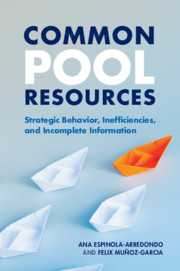Book contents
- Frontmatter
- Contents
- List of Figures
- List of Matrices
- Preface
- 1 Introduction
- 2 Common Pool Resources in a Static Setting
- 3 Common Pool Resources in a Dynamic Setting
- 4 Entry Deterrence in the Commons
- 5 Repeated Interaction in the Commons
- 6 Commons under Incomplete Information
- 7 Signaling in the Commons
- Appendix A Game Theory Tools
- Appendix B Solutions to Selected End-of-Chapter Exercises
- Bibliography
- Index
Preface
Published online by Cambridge University Press: 03 August 2023
- Frontmatter
- Contents
- List of Figures
- List of Matrices
- Preface
- 1 Introduction
- 2 Common Pool Resources in a Static Setting
- 3 Common Pool Resources in a Dynamic Setting
- 4 Entry Deterrence in the Commons
- 5 Repeated Interaction in the Commons
- 6 Commons under Incomplete Information
- 7 Signaling in the Commons
- Appendix A Game Theory Tools
- Appendix B Solutions to Selected End-of-Chapter Exercises
- Bibliography
- Index
Summary
This textbook offers an introduction to the analysis of common pool resources, such as fishing grounds, aquifers, and forests, using gametheory tools familiar for most undergraduate students in economics, business, and social sciences.
Since Gordon (1954) and Hardin (1968), a large body of literature has emerged – theoretical, but especially experimental and field studies – seeking to understand the main incentives behind individuals and firms exploiting a common pool resource (CPR). These studies also focus on identifying which institutions and information contexts help ameliorate the so-called tragedy of the commons, where every individual ignores the effect that their appropriation causes on other individuals exploiting the resource, leading to its overexploitation. While several authors develop literature reviews, they mostly focus on the institutional arrangements that induce individuals to reduce their appropriation in the commons; see Ostrom (1990,1994, and 2000), Carpenter (2000), Faysee (2005), or Araral (2014).
These are important points, but literature reviews often overlook (or significantly summarize) the mathematical representation of how to find equilibrium behavior in CPRs, how to identify the socially optimal appropriation, how to measure the inefficiencies that arise, and how incomplete information affects equilibrium behavior. This textbook seeks to fill this gap by providing a relatively brief introduction to CPR models and results, specifically targeted to upper-level undergraduate and graduate students.
Our presentation emphasizes the intuition behind each modeling assumption, the steps we need to follow to solve similar CPR problems, and the economic interpretation of each result. In addition, it assumes only a basic background in intermediate microeconomics, and perhaps some game theory, but does not require readers to have a good command of dynamic programming techniques and differential game theory, as opposed to Dockner et al. (2000).1 While CPR problems are often presented using these techniques, we believe that the main incentives behind players exploiting a resource can be discussed without the need to rely on advanced mathematical tools. As a result, we expect our text to be appropriate for undergraduate courses in environmental economics and in natural resource economics for students undergoing economics and business degrees, environmental policy for students undergoing public policy or political science degrees, or as a first introduction to the topic for graduate students.
Information
- Type
- Chapter
- Information
- Common Pool ResourcesStrategic Behavior, Inefficiencies, and Incomplete Information, pp. xiii - xviiiPublisher: Cambridge University PressPrint publication year: 2021
